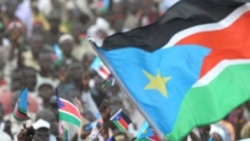South Sudanese President Salva Kiir did an about-face Sunday and traveled to the Ethiopian capital to attend the final hours of talks to end South Sudan's 20-month war.
Cabinet Affairs Minister Martin Elia Lomoro -- who on Friday said Mr. Kiir would not be attending the talks -- told reporters at a hastily convened news conference in Juba that President Kiir had been convinced by regional leaders, "and especially President Yoweri Museveni, who we consider a wise leader and who we have great linkage with," to attend the talks.
Lomoro did not indicate if President Kiir is likely to agree to a deal by Monday's deadline, set by the international mediation team, IGAD-Plus.
"He is going to explain to his colleagues the challenges that are now confronting the signing of the compromise agreement," Lomoro said.
In response to a reporter's question, Lomoro later said, "We will be there (in Addis) forever until we achieve peace."
Challenges
Among the challenges the government sees as blocking a deal is a split in Riek Machar's SPLM-in-Opposition (SPLM-IO), the main group fighting the government since South Sudan erupted in conflict in December 2013.
Several SPLM-IO military commanders announced early this week that they have broken away from the group and set up their own political movement and fighting force.
"Dr. Machar has already been ousted and disowned by his army and politicians and, if we sign peace, we have to sign peace with all the factions and groups that are fighting in South Sudan," Lomoro said.
"Peace must be durable. It must be a peace that encompasses everybody, not a peace that we sign with Riek Machar and, when he comes in, we are still having war," Lomoro said.
Lomoro's statement was at odds with a demand made last week by government officials at the talks, who said they only want to negotiate with the SPLM-IO, not with a third party of former detainees who were also at the negotiating table.
Kampala agreement
Lomoro said Mr. Kiir also wants to ensure that changes that were made by the leaders of Ethiopia, Kenya, Sudan and Uganda at a mini-summit in Kampala last week are incorporated into the deal being negotiated in Addis Ababa.
Machar has said the changes are unacceptable and, potentially, a deal-breaker.
IGAD-Plus chief mediator Seyoum said Saturday only changes that are mutually agreed to by both teams of negotiators will be included in the final agreement.
More reasons
On Friday, Lomoro said the split in the SPLM-IO made it unclear who Mr. Kiir's chief interlocutor would be in Addis Ababa. He also said Friday that the entire government negotiating team was being recalled to Juba for consultations.
Two days later, Lomoro gave several other reasons why Mr. Kiir decided initially not to go to Addis. Among them was that the president had not been sufficiently briefed by chief government negotiator Nhial Deng Nhial on what has been agreed to at the peace talks and what points are still under debate.
"What we said (Friday) is that the chief negotiator was supposed to come and update the president as to how they have gone in the negotiations," Lomoro told reporters.
Deng has given a different reason for Mr. Kiir not showing up in Addis -- he said the president received his official invitation too late -- and has adamantly denied that his team had been ordered back to Juba.
'We are not afraid of sanctions'
Lomoro insisted Mr. Kiir's about-face was "not a response to the threats from all over the world," including a warning that targeted sanctions could be imposed on top-tier officials in South Sudan if no deal is reached by the deadline.
"We are not afraid of sanctions," Lomoro said. "This country belongs to us. The peace we are talking about is a peace for us, not for them. It is us who fought for many years to make our country an independent state."
He said the decision for Mr. Kiir to travel to Addis was taken in response to "the needs of the country and... to the call of our colleagues in the region."
At least 10,000 people have been killed in the conflict in South Sudan, more than 2 million have been forced from their homes and nearly 5 million face severe hunger because of the fighting.
IGAD-mediated peace talks have been underway since January last year, and have resulted in several agreements to end the violence, all of which have been violated within hours of being signed.









